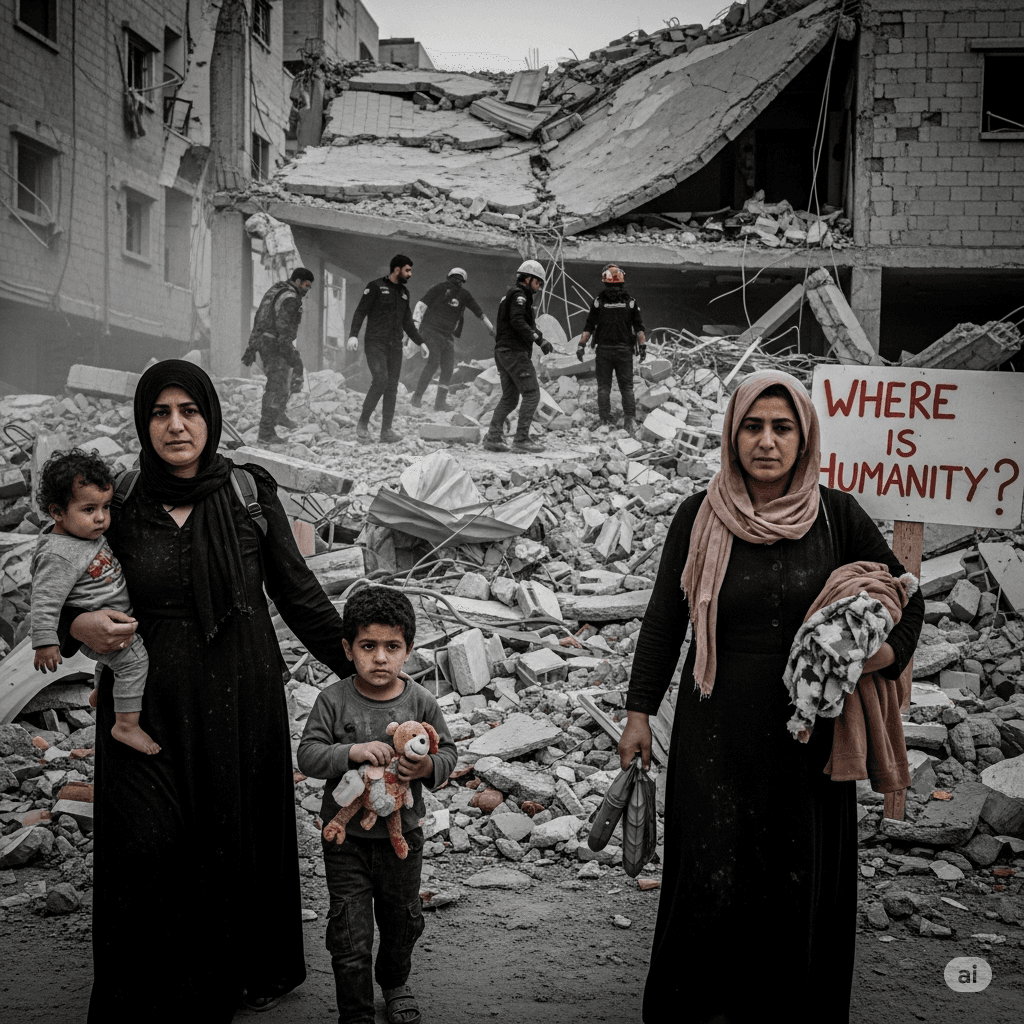Alright God Damn-it. Let’s talk about “Gaze.” Not the kind you do at a sunset, but the kind where the world trains its eyes on a hellscape and then pretends to be shocked. We hear endless chatter about “International Humanitarian Law,” about the “laws of armed conflict.” Sounds real official, real comforting, right? Like there’s some rulebook to stop the madness. But when you look at what’s happening in Gaza, what you see is that rulebook being shredded, pages scattered in the rubble, and humanity bleeding out on the street. Jack Hammer’s here to tell you, what they call “law” often looks an awful lot like a suggestion when the bombs are falling.
The Fancy Rulebook: What IHL Should Be
So, what is this “International Humanitarian Law” (IHL) everyone’s supposed to be abiding by? It’s the so-called “laws of war,” cooked up to put some brakes on the slaughter. The big ideas are simple enough, even for a politician’s brain:
First, Distinction: You gotta know who you’re shooting at. Combatants are fair game. Civilians? They’re off-limits. You hit a school, a hospital, a residential tower, and it’s full of non-combatants? That’s not collateral damage; that’s a damn problem.
Second, Proportionality: Even if you’ve got a legitimate military target, you can’t level an entire city block just to take out one guy if you know it’s gonna wipe out a hundred civilians. The harm to civilians has to be proportionate to the military gain. Common sense, right? Apparently, it’s not so common.
Then there’s Military Necessity and Humanity. You only use the force absolutely necessary to achieve a legitimate military objective, and you still gotta treat people with basic decency. No unnecessary suffering, no torture, no denying basic needs. These aren’t suggestions for a polite tea party; these are supposed to be the bedrock principles of fighting when you claim to be civilized.
The Gaza Grind: Where Law Goes to Die
But take those fancy principles and drop them into the cauldron that is Gaza. It’s one of the most densely populated places on Earth. And suddenly, these “laws” become whispers in a hurricane.
We hear the excuses: “The enemy hides among civilians!” “They use tunnels under schools!” And while every party in a conflict has an obligation to protect civilians, let’s be crystal clear: International Humanitarian Law is non-reciprocal. One side’s alleged violations do not absolve the other side of its obligations. You don’t get a pass to flatten a hospital just because your enemy might have been near it. You don’t get to starve a population because you claim hostile elements are embedded within it.
What we’ve seen, time and again, are direct attacks on civilian infrastructure – hospitals, schools, residential buildings, even refugee camps – turned into dust. Warnings are given, sometimes, but if civilians have nowhere to go, or if the warnings are just psychological warfare to spread terror, then they’re worthless. And under IHL, those civilians remain protected. They don’t magically become legitimate targets just because they couldn’t or wouldn’t evacuate.
The systematic obstruction of humanitarian aid, the cutting off of essential services like water, food, and electricity – these aren’t just unfortunate side effects of war. When they become methods of warfare or collective punishment, they’re not just violations; they’re war crimes. It’s the deliberate weakening of an entire population, using starvation and deprivation as weapons.
Accountability? Don’t Hold Your Breath.
Every time the dust settles, or even before it does, we hear about calls for investigations, for accountability. “War crimes,” “crimes against humanity” – the big words get thrown around. IHL states that those who commit these acts, and even commanders who knew or should have known and failed to act, can be held criminally liable.
But where’s the actual accountability? The International Criminal Court has jurisdiction, but it’s a slow-grinding wheel, often bogged down by politics and power plays. The reality is, powerful nations and their allies often operate with a degree of impunity that the “laws of war” were supposedly designed to prevent. It’s a selective application of justice, where the strong dictate who gets investigated and who gets a pass. The humanitarian principles are shouted from the rooftops, but the military necessity clause seems to be whispered in dark rooms, often overriding everything else.
Cut Through the Crap: Demand Real Humanity
Jack Hammer’s had enough of the double talk. This isn’t about taking sides in a bloody, tangled conflict. This is about basic humanity and the utter betrayal of a legal framework designed to protect it. When International Humanitarian Law becomes a punchline, when “distinction” means distinguishing between the dead and the dying, we’ve lost more than just a battle. We’ve lost our way.
It’s time for the world to stop gazing in horror and start demanding actual adherence to IHL. Not just condemnation, but consequences. We need independent investigations, enforceable accountability, and an end to the convenient excuses that turn war crimes into “operational necessities.” The people in Gaza, caught in this relentless grinder, deserve more than empty legal rhetoric. They deserve the protection that the world claims to have enshrined in law.
Yours truly, Jack Hammer.














